Aug 2019 2nd Edition
Aug 2019 2nd Edition Londekile
Translations
Let’s talk to reduce teenage pregnancy
Let’s talk to reduce teenage pregnancy angenithaWith some 82 000 learners between the ages of 14 and 19 having fallen pregnant in 2017 alone, South Africa is pinning its hopes on a social and behaviour change campaign to curb early and unplanned teen pregnancies.
Known as the “Let’s Talk”, this campaign is implemented across 21 countries in the Eastern and Southern Africa region, which has one of the highest adolescent fertility rates in the world.
The campaign is driven by multiple factors which include poverty, lack of information and access to reproductive health services, cultural norms, peer pressure, sexual coercion and abuse.
A United Nations Educational, Scientific and Cultural Organisation (Unesco) situational analysis reported that in some countries, up to 95 percent of young girls drop out of school after pregnancy.
Basic Education Minister Angie Motshekga recently launched the “Let’s Talk” campaign in Gauteng.
In South Africa, it is reported that up to one-third of young girls who fall pregnant drop out of school.
“Teen pregnancy impacts on education [outcomes]. Unfortunately, this scourge disproportionately affects girls from lower socio-economic communities, thus adding on their burden,” Motshekga said.
“We hope to share and learn from other countries on how to address this stubborn challenge. We need a coordinated and cohesive effort to accelerate progress in the prevention and management of early and unintended pregnancies (EUP),” Motshekga said.
Unesco Regional Director Remmy Shawa said while girls should be taught about pregnancy, boys should not be left out of the equation.
“Early pregnancy has consequences on the lives of young girls. They face shame from their communities and miss out on education… Let us not forget that boys are part of the problem and that they are also part of the solution,” said Shawa. SAnews.gov.za
Adults seek justice for childhood sexual abuse
Adults seek justice for childhood sexual abuse angenithaSisters Lisa van der Merwe (56) and Claudine Shiels (60), who were allegedly sexually abused by relatives from 1974 to 1979, are taking their offenders to trial this month to seek justice for the crimes committed against them 40 years ago.
This has been made possible by the amendment of the Criminal Procedure Act, in 2018, which removed the time restriction of 20 years that was in place for prosecuting offenders.
It is good news for adults who suffered sexual abuse as children, as they can now seek justice and take back their power. It also sends a strong message during Women’s Month to sexual and Gender-Based Violence (GBV) offenders, that their crimes will not go unpunished.
The case will appear before the Wynberg Magistrate’s Court in August, when the accused are expected to plead.
Changing the law
In May 2018, Cabinet approved the introduction of the Criminal Procedure Amendment Bill, 2018, which amends the Criminal Procedure Act. The proposed Bill also extends the list of sexual offences in respect of prosecution.
The changes came about following the South Gauteng High Court’s judgement in the Levenstein court case, in which eight women wanted to lay criminal charges against Sidney Frankel, who they accused of being a paedophile. Frankel has since died.
In a unanimous judgment, the Constitutional Court said the law was “…inconsistent with the Constitution and invalid to the extent that it bars, in all circumstances, the right to institute a criminal prosecution for all sexual offences, other than rape or compelled rape; trafficking persons for sexual purposes and using a child or person who is mentally disabled for pornographic purposes; after the lapse of a period of 20 years from the time when the offence was committed.”
“The Amendment Bill will go a long way in tightening the justice system,” said Acting Cabinet spokesperson Phumla Williams at the time.
“The Bill in itself says that from now onwards, even if it’s 20 years later, you can choose to come out. There are various reasons some people die in silence and don’t report these crimes. But, at a later stage, a person will be able to say, ‘I was raped by a neighbour or by my cousin’,” she added.
The Constitutional Court gave Parliament two years to make the changes and signalled that inaction would result in an automatic implementation of its ruling.
The amendments enable the National Prosecuting Authority wider discretion to institute prosecutions in sexual offences, in accordance with Chapter 2 of the Constitution.
Minimum sentences
The Criminal Law Amendment Act 105 of 1997 compels courts to impose minimum sentences for certain crimes, unless compelling circumstances justify a lesser sentence.
The Act sets the prescribed minimum sentence of life imprisonment for crimes related to aggravated murder, aggravated rape and aggravated compelled rape. First-time rape offenders (without aggravating factors) will receive a minimum sentence of 10 years, second offenders will receive a minimum of 15 years and third offenders a minimum of 25 years.
The Criminal Law Sexual Offences and Related Matters Amendment Act further protects victims of GBV, outlining a variety of sexual abuse crimes.
Baloyi tackles stereotypes on the rugby field
Baloyi tackles stereotypes on the rugby field tsoanaWomen's Month
While netball and women’s soccer have received much attention in recent months, other sportswomen competing in codes such as rugby still fight gender stereotypes.
University of Pretoria student Kemisetso Baloyi (21) is a rising star in the world of rugby, representing the South African Students Rugby Women’s Sevens Team.
The team recently returned from the World University Games in Italy, where they finished in fourth place behind some strong competition.
Born in Soshanguve, Baloyi discovered rugby in 2013, when she was in Grade 10.
“I needed something to do in my free time. A friend at my high school was playing rugby so I asked her a few questions and she invited me to come along to practice. At high school there was only netball available for girls so I went with my friend to the Komuso Youth Rugby Club and found a love for rugby,” said Baloyi.
Baloyi’s love for the sport continued into university, where she was given the opportunity to play for the University of Pretoria while doing her BA Law degree and made the national student’s team.
“Rugby is traditionally viewed as a men’s sport. It’s always either the national men’s teams or the more feminine sports that get attention. Women’s rugby deserves a lot more support in terms of financing.”
Baloyi said that fortunately, the stereotypes are slowly changing and the game is starting to get more exposure.
“We are in a promising stage where women’s rugby is eventually getting more exposure. It is very underdeveloped right now but we are making some great strides in getting our names out there and starting to compete with other countries that better support women’s rugby.
“Rugby is an amazing sport. To the girls out there who want to play rugby – forget about the stereotypes; forget about what people say and think. If you have a passion for it, then just go for it!”
Baloyi is grateful for the opportunities that democracy has provided to young black women such as herself. “Democracy has expanded the whole scope of what we can do. We reach for our goals and achieve our dreams, instead of being stuck in a box. So yes, we can be very thankful for that.”
Banyana Banyana inspires future stars
Banyana Banyana inspires future stars angenithaBanyana Banyana’s effort at the Fifa World Cup is inspiring a new generation of women to get into the sport.
This is according to Banyana Banyana captain Janine van Wyk (32), who has played for the team for the past 14 years.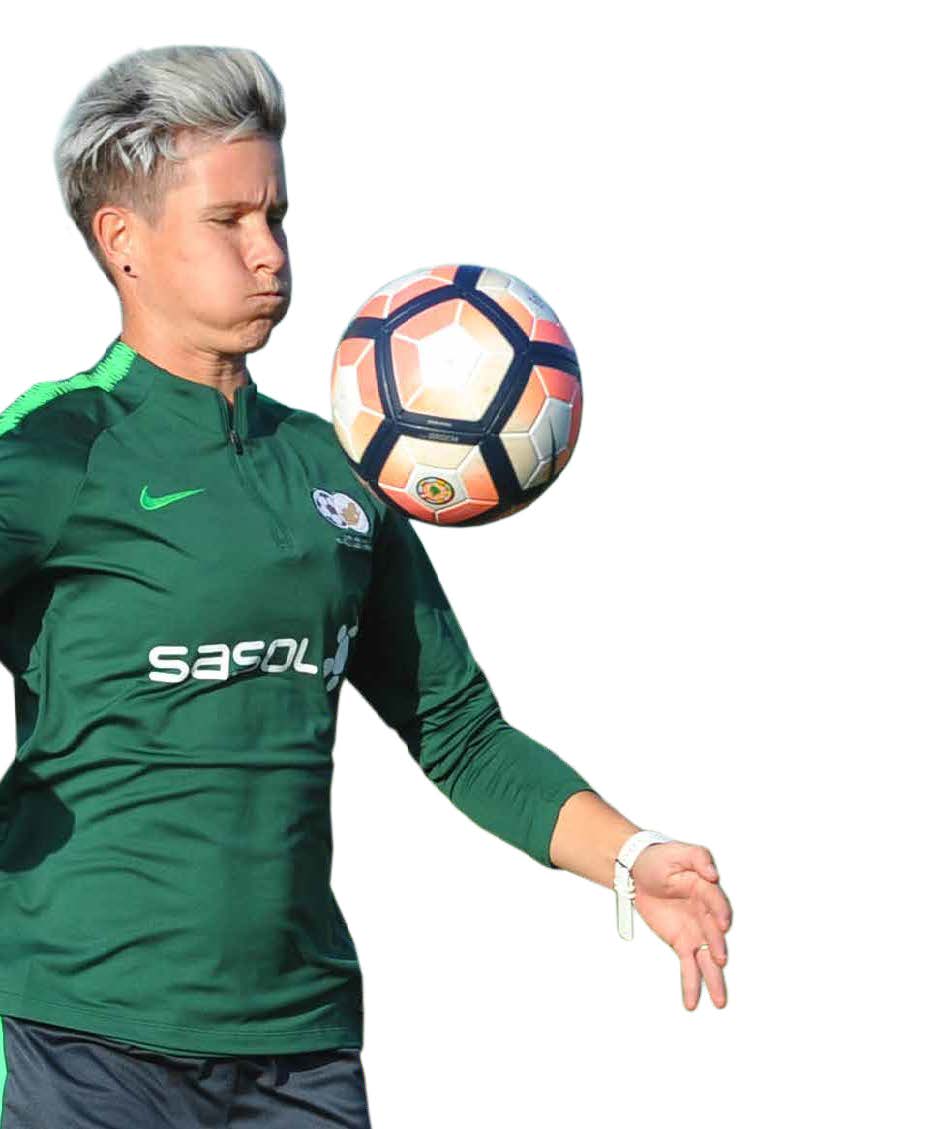
“Representing our country at the highest level has done a lot for the women’s game in South Africa. We have a lot of supporters, especially young girls, and this gives us strength,” said Van Wyk.
She believes that the development and success of women’s sport could result in social and economic improvements for South Africa. “There are girls out there who are talented and not making use of their talent. They get into the wrong things on the streets and waste their talent,” she said.
Van Wyk opened the JVW Girls Football Club to help young, female soccer players as she believes it’s important for them to receive assistance when they are young. “In order for our country to succeed, it is important to have development structures in place for women from a very young age. Then we can teach them the right values in life and sport,” she said.
Van Wyk also believes that sport can be used as a tool to achieve social cohesion. She explained that young people, who participate more in sport, socialise with other youth from different areas.
“It’s not only development within the sport. It’s also about developing life skills,” she said.
Playing a team sport has taught Van Wyk that working together is the best way to achieve goals. “Women empower other women. In soccer, you have to be there for one another,” she said.
It was team work that enabled Banyana Banyana to earn praise as it competed against the giants in women’s football at the World Cup. The team took on Spain, China and Germany, which were all ranked much higher.
Van Wyk added that with August being Women’s Month, South Africans need to start believing in women’s football especially since the sport is on the rise for women.
Dr Nndanganeni explores the galaxy
Dr Nndanganeni explores the galaxy UrsulaNearly 10 years of tertiary study and a passion for physical science earned Dr Rendani Nndanganeni (33) her dream job as a space science researcher at the South African National Space Agency (SANSA).
SANSA is a government agency that reports to the Department of Science and Technology, and is part of the worldwide network of space weather centres and magnetic observatories. It plays an important part in monitoring the near-Earth space environment.
In simple terms, the agency works mainly with satellites.
 After completing matric in rural Limpopo, Dr Nndanganeni’s decade of tertiary study began. Today, she holds a PhD in Space Physics.
After completing matric in rural Limpopo, Dr Nndanganeni’s decade of tertiary study began. Today, she holds a PhD in Space Physics.
“I developed a love for physics while in my first year; that is when I got to better understand the physical science concepts I was taught in high school,” she said.
She was fortunate enough to get a National Student Financial Aid Scheme loan that paid for her undergraduate studies, before being granted a SANSA bursary.
She joined SANSA in 2016 as a space science researcher.
Although her job is a bit multi-faceted and she has worked on a number of research projects, Dr Nndanganeni is currently researching the impact that space weather has on aviation.
Space weather refers to the changing conditions on the sun and in space that can influence the performance of the technology we use on Earth.
“We look at important areas in aviation, such as how space weather impacts communication in the aviation industry, navigation of aircraft and the impact of radiation in space,” she explained.
Dr Nndanganeni is based at the regional warning centre in Hermanus in the Western Cape.
She encourages young people to consider a career in space science because there are many opportunities, thanks to the Fourth Industrial Revolution.
“Over and above the careers that are already available at SANSA, there will always be a need to innovate new technology and develop new ways of doing things. That means we will always need professionals who can make this possible,” she said.
Dr Nndanganeni advised young people interested in a career in space research to take up mathematics and physical science as main subjects in high school.
Funding scheme for co-operatives
Funding scheme for co-operatives angenithaPrimary co-operatives can now access funding of up to R1.5 million, thanks to a Department of Small Business Development's programme.
The Co-operatives Incentive Scheme (CIS) helps co-operatives access funding, provided they meet a certain criteria.
The department said one of the requirements is that entities must be incorporated and registered in South Africa in terms of the Co-operatives Act of 2005.
The scheme is also said to be more favourable towards women, youth and people with disabilities.
The department added that people who are historically disadvantaged, have projects in any of the economic sectors, have emerging co-operatives with a majority black ownership and adhere to co-operative principles have a better chance of accessing the scheme.
Co-operatives that want to apply for funding can download an application form from the department’s website.
It should be completed and submitted, along with an original SARS Tax Clearance Certificate, a detailed business plan, a co-operative resolution to apply for the CIS grant; a copy, signed by the founder members, of the co-operative’s constitution; copies of the curriculum vitaes and identity documents of the co-operative’s directors and a copy of the co-operative registration certificate.
Co-operatives can contact the department’s provincial offices for advice on how to put together an application.
Some of the guidelines of the scheme include that 70 percent of the funding may be used for infrastructure, machinery and equipment, commercial vehicles, technological improvements and tools.
Thirty percent of the funding may be used for working capital.
Primary co-operatives in South Africa are recognised as co-operatives with a minimum of five members. The co-operatives must also be registered, have proper banking details and a constitution that governs the co-operative.
Due to limited funding, prioritisation will be given to those co-operatives that demonstrate the potential to sustain jobs, eventually create more jobs, promote economies of scale and scope and contribute to community development.
The scheme offers a minimum of R400 000 and a maximum of R1. 5 million in funding to each co-operative.
GBVF’s lifelong effects on children
GBVF’s lifelong effects on children Ursula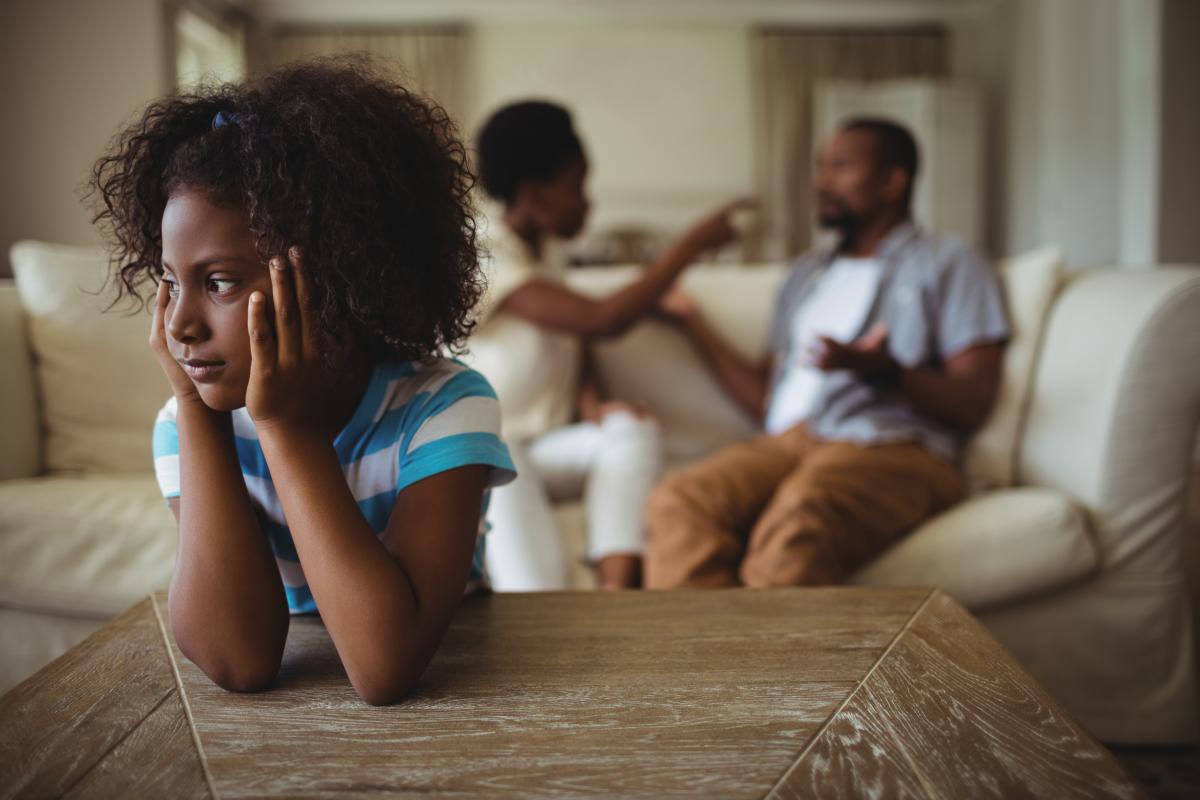 Gender-Based Violence and Femicide can have a severe impact on a child’s physical health, growth and development.
Gender-Based Violence and Femicide can have a severe impact on a child’s physical health, growth and development.
Children growing up in a household with Gender-Based Violence and Femicide (GBVF) often feel hopeless.
This is according to Dr Dudu Ngubeni, an occupational medical doctor at the Gauteng Department of Health, who confirmed that all forms of GBVF are a violation of children’s rights.
GBVF refers to violence that targets individuals or groups, based on their gender differences. “GBVF is a sad reality worldwide and is shockingly prevalent in South Africa,” said Dr Ngubeni.
“Imagine what rape and physical assault does to children. In addition to physical injuries and long-lasting emotional and psychological problems that could lead to suicide, there are also social issues, stigma and rejection,” she added.
Long-lasting effects
The impact of GBVF on children differs due to various factors, such as the nature, frequency and severity of the abuse. Other stressors in the family, such as a parent with mental health or substance abuse problems can make the impact greater.
GBVF can be verbal, physical, sexual or psychological. “Children are at an increased risk of emotional and behavioural problems, regardless of whether they were directly abused or not,” said Dr Ngubeni.
“It is a well-documented reality that men, in general, have power and control over women and children, and often through violence. GBVF deprives children of an environment that enables them to fully develop their potential. They can become desensitised to suffering and may learn to see the use of violence as a means to achieve their own aims,” she added.
Younger children witnessing or experiencing GBVF could display anxiety or increased fear; depression; loss of interest in school, friends or other things they enjoyed in the past; sleep problems, including nightmares or bedwetting; increased aggression; anger or changes in appetite.
Older children react differently. Boys could express their distress outwardly, by becoming aggressive; using violence to solve problems; or using alcohol or drugs, to block out disturbing experiences and memories.
Girls are more likely to keep their distress inside. They may become withdrawn, anxious or depressed; have an eating disorder or harm themselves by cutting or using alcohol or drugs.
In most cases, the impact of GBVF on children lasts for a long time after the abuse itself. As adults, these children are more likely to become involved in a violent and abusive relationships themselves. “Studies have shown that children who experience GBVF could grow up believing in power inequalities in interpersonal relationships and society. They then reproduce a structure that enables GBVF,” Dr Ngubeni explained.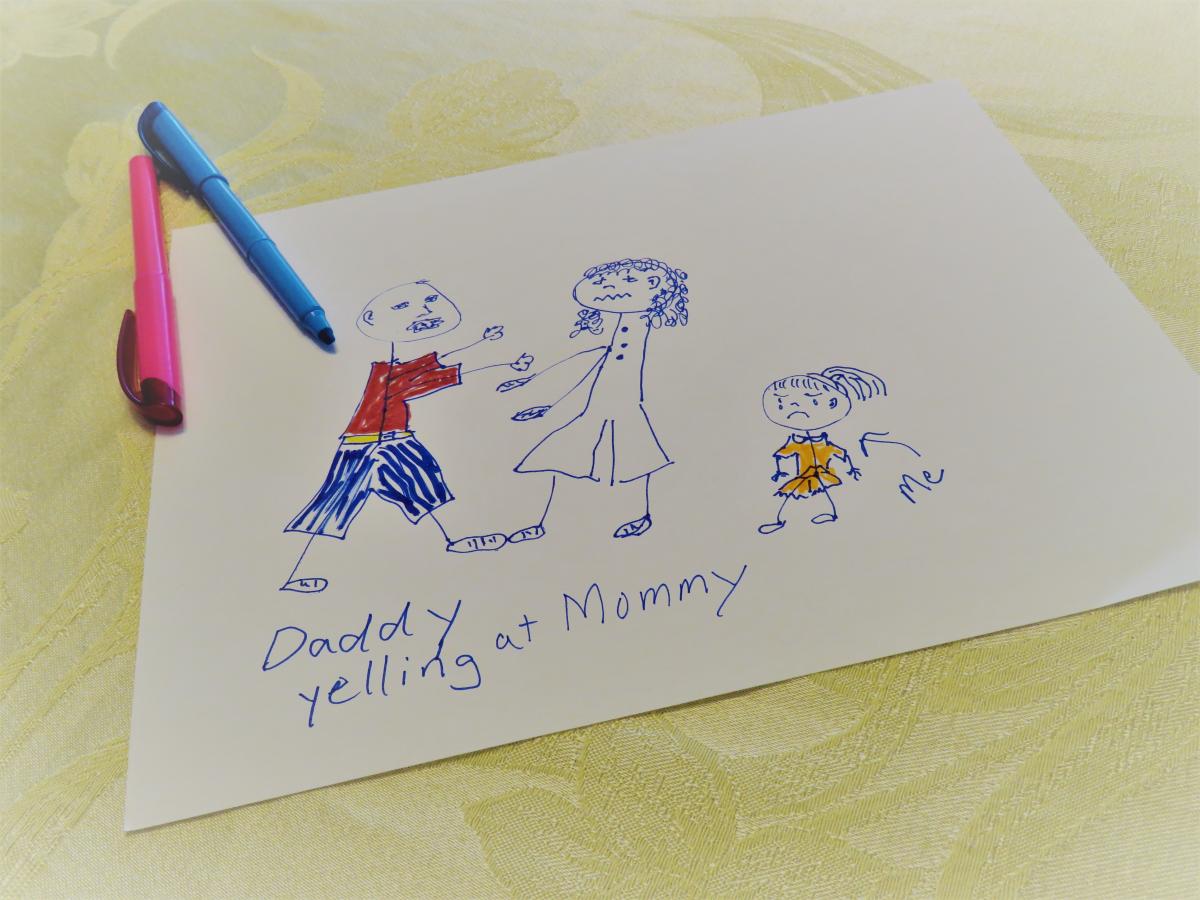
Children might become perpetrators of GBVF
Siliziwe Mbambo, a child protection social worker from the Saartjie Baartman Centre for Women and Children (SBCWC), agrees. “In later life, the child might become a perpetrator of GBVF or a substance user,” she said.
The SBCWC handles new cases of GBVF daily. “Most children are affected either directly or indirectly by GBVF, which places them at severe risk. The centre has also observed an increase in the number of people in need of services and GBVF is a common factor,” said Mbambo.
In one case, a child was suicidal due to a lack of parental support, love and attention. “The parents were constantly having physical and verbal fights, in front of the child. As a result, the child lost the motivation for school and future goals,” said Mbambo.
Children tend to copy behaviour. Boys learn from their fathers to be violent to women. Girls learn from their mothers that violence is normal and something they have to put up with. However, not all children repeat the same pattern. Many try not to make the same mistakes as their parents.
Children and adolescents exposed to GBVF should be evaluated by a trained mental health professional, who will recommend the necessary treatment for emotional and behavioural problems. Treatment can include therapy and, in some cases, medication may be helpful. The non-abusive parent or caregiver also needs support.
For more information about getting help for children who are affected by GBVF, contact the GBV Command Centreís tollfree helpline at 0800 428 428 or request a social worker to contact you by dialling *120*7867# from your cellphone.
You can also contact the Stop Gender Violence Helpline at 0800 150 150 or the SBCWC at 021 633 5287.
Gender-Based Violence impacts us all
Gender-Based Violence impacts us all Ursula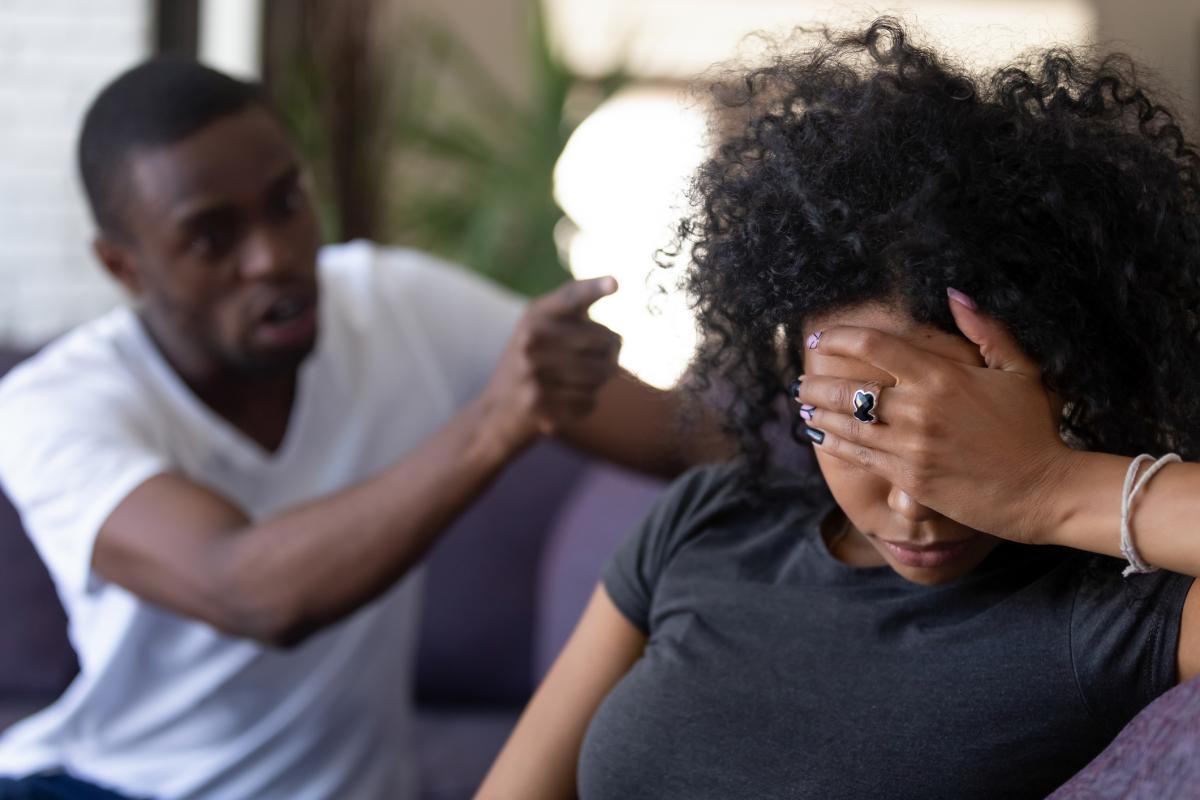 South Africa is committed to a united, comprehensive and effective response to gender-based violence and femicide (GBVF).
South Africa is committed to a united, comprehensive and effective response to gender-based violence and femicide (GBVF).
As government we have called on all sectors of society to join the fight against GBVF. We have also stepped up government’s own efforts to end this scourge in our society.
The first Presidential Summit against GBVF was held in November 2018, and in March 2019 the Presidential Launch and signing of the GBVF Declaration took place.
The Summit developed the Declaration with the following goals in mind: ensuring effective political and community leadership of the fight against GBVF; the establishment of a multi-stakeholder GBVF council that will develop a National Strategy with Action Plan for GBVF; the continued roll-out of Thuthuzela Care Centres, which are one-stop facilities that are a critical part of South Africa’s anti-rape strategy; adequate funding for GBVF programmes; women-centred economic development; a targeted, social behaviour change programme to address patriarchal values and norms; and fast tracking the review of existing laws and policies on GBVF to be victim-centred.
We are diligently working with our social partners to implement the declaration.
The Department of Justice and Constitutional Development has completed the first phase of the establishment of a Femicide Watch, which is a data-bank that will enable the department to collate data, pick up trends and profile the victims and perpetrators. This will help develop adequate responses to GBVF.
No less than 92 dedicated sexual offences courts have been established and a further 16 will be rolled out between now and the end of March 2020. These courts will ensure that gender-based violence cases are managed more effectively so that survivors will get justice done at a much faster rate.
The courts also work closely with 55 Thuthuzela Care Centres, which work to reduce secondary trauma for the victims, improve perpetrator conviction rates and reduce the time it takes to finalise cases.
As a result of these centres and specialised courts, more perpetrators are finding themselves behind bars. During the 2018/19 financial year, just under three-quarters of gender-based violence cases resulted in convictions.
Survivors and perpetrators will therefore testify that we are making good progress.
Further, the Department of Social Development received R50 million from the Criminal Assets Recovery Account to strengthen civil society organisations working in the victim empowerment field.
While government will continue to prioritise this social ill, we are calling on all South Africans to join the fight against GBVF.
Men are not born abusers. Instead, social customs that are handed down from generation to generation breed the belief that men have the right to dominate women.
Society needs to break this cycle!
Every individual – whether parent, teacher, church leader, politician, grandparent, sibling, aunt or uncle – must actively contribute to changing attitudes and behaviours away from the current rape culture.
It is time to for all of us to stand up and play our part in creating an inclusive, safe society for all genders.
Through positive parenting, we must teach our sons to value and respect our mothers and girls who are the givers of life and play a critical role in creating stable, happy homes that produce well-rounded future leaders.
Phrases like ‘boys will be boys’ and jokes that objectify women have no place in a world that still rates women as second-class citizens.
Men who abuse their partners and children must be reported to the police and cold-shouldered by the community. Victim blaming must end too because it sends out the message that in some instances violence is justifiable. It never is.
The message must ring out loudly that hurting women and children is not acceptable in any circumstances.
Men wanting to be change agents – or to shift their own mindsets – should actively participate in programmes that promote dialogue around what it means to be a ‘real man’, and become part of a broader plan that focuses on ending GBVF.
Women have been made vulnerable through patriarchy, historical oppression and exclusion from economic activity, and to correct this every effort must be made to ensure that they feel safe, free and equal, as is their right guaranteed by our Constitution, most especially section 9, 11 and 12.
Working together I am certain we can be the generation that empowers, builds, respects and protects women.
If you are a victim or know of a victim of abuse call the GBV Command Centre at 0800 428 428 for help.
Have a safe pregnancy
Have a safe pregnancy tsoana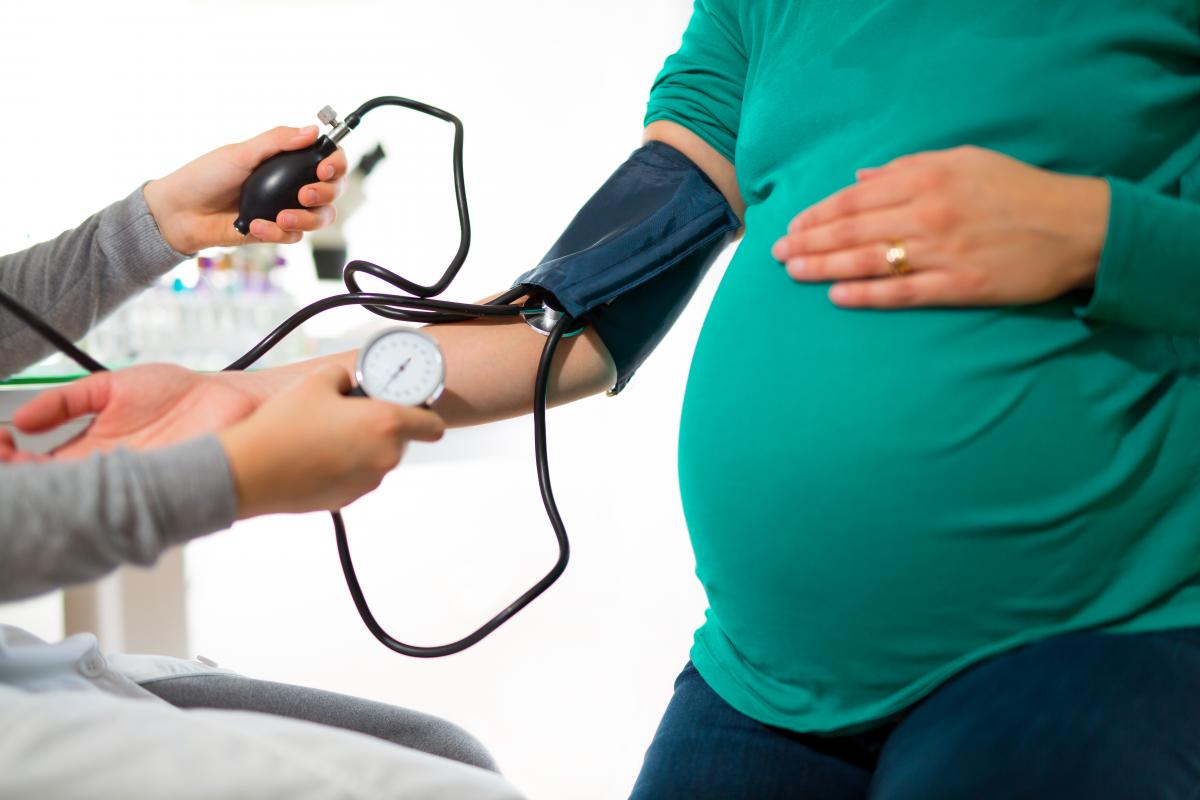 It is important for pregnant women to receive antenatal care during their pregnancy.
It is important for pregnant women to receive antenatal care during their pregnancy.
This care is free at all public clinics. According to the National Department of Health, antenatal care is vital for ensuring that any potential risks during pregnancy can be prevented or identified. It allows for frequent monitoring of the unborn baby's movements and growth, and gives early detection and timely treatment of health problems.
Antenatal care appointments also allow expectant mothers to ask any questions about their pregnancy and about giving birth. The World Health Organisation recommends that all pregnant women should have at least eight antenatal visits during their pregnancy.
From 1 April 2017, the Department of Health also encouraged all women to follow this guideline, in order to reduce mortality rates of infants and mothers.
When should antenatal care visits start?
Women who suspect that they might be pregnant should schedule a visit to their clinic or doctor as soon as possible to confirm the pregnancy and start receiving antenatal care.
The Department recommends that women come in for their appointments on Week 14, 20, 26, 30, 34, 36, 38 and 40 of their pregnancies.
Visits to the clinic for antenatal care include a check-up of the mother’s general health, including blood pressure, weight measurement, urine sampling and testing for sexually transmitted infections and tuberculosis.
During some of the visits, healthcare providers may do blood tests and ultrasounds. They will also be able to answer any questions from expectant mothers about the pregnancy and birth.
The Department also encouraged men, partners or other family members to be with the pregnant women during visits, because support during pregnancy is very important for a healthy mother and baby.
Get antenatal support with MomConnect
MomConnect is a Department of Health initiative which provides important information to pregnant women throughout their pregnancy.
To register:
Dial *134*550# from your cell phone.
Answer a few simple questions about your pregnancy.
Pregnancy is registered in the national database.
User receives weekly SMS messages to inform them of their pregnancy and baby health (up to when the child is one-year-old).
Have you done your Pap smear?
Have you done your Pap smear? tsoana All sexually active women and those over 25 must have a Pap smear done at least once every three years to screen for cervical cancer, the second most common cancer in South African women.
All sexually active women and those over 25 must have a Pap smear done at least once every three years to screen for cervical cancer, the second most common cancer in South African women.
A Pap smear is a quick, painless test done by a doctor or gynaecologist to detect early changes in cells in the cervix – the lower part of the uterus that opens into the vagina – which could progress to cancer.
According to the KwaZulu-Natal Department of Health, cervical cancer does not suddenly develop. There is a gradual change in the cells from normal to abnormal before they become pre-cancerous and then cancerous. A Pap smear is used to detect these changes so that treatment can start early and cervical cancer can be prevented.
Women should have one Pap smear done every three years, from the age of 25 to 65. If abnormal cells are found, more frequent smears may be recommended, even after the age of 65. However, women who have had a hysterectomy which is a surgical procedure that removes all or parts of the uterus - do not have to have Pap smears anymore.
What happens during the Pap smear procedure
A Pap smear is performed in the doctor's examination room and only takes a few minutes. You lie down on your back on an examination table, with your knees bent, while the doctor gently inserts an instrument called a speculum into your vagina. The speculum holds the walls of your vagina apart so that your doctor can easily see the cervix. Samples are taken of your cervical cells, using a soft brush or flat scraping device called a spatula, and sent to a laboratory for testing.
While a Pap smear is not sore, it can be slightly uncomfortable. After the test, you can carry on with your normal daily activities.
A Pap smear is usually done during a routine pelvic exam. In women older than 30, a Pap smear can be combined with a test for human papillomavirus (HPV), a common sexually transmitted infection. Almost all cervical cancers and some cancers of the vagina and vulva are caused by HPV.
If a Pap smear is positive and the woman is not treated, she is at high risk of developing cervical cancer over a five- to 30-year period. However, if abnormalities are detected and treated, progression to invasive cervical cancer can be prevented.
DID YOU KNOW?
A Pap smear is free and can be done at any primary healthcare facility such as a clinic or a community health centre.
For more information about having a Pap smear done, visit your nearest clinic or doctor.
Help is on hand for GBV survivors
Help is on hand for GBV survivors Ursula Abuse survivors are often lonely, isolated and filled with fear. Finding the courage to get help is not easy but there are a number of organisations ready and waiting to support those who reach out.
Abuse survivors are often lonely, isolated and filled with fear. Finding the courage to get help is not easy but there are a number of organisations ready and waiting to support those who reach out.
People who fall victim to Gender-Based Violence (GBV) often think that there is no way out, but South Africa has a number of organisations that help with support, counselling and healing.
Survivors can call places of safety to find out the best way of escaping an abusive relationship and for counselling and support.
Vuk’uzenzele compiled a list of places you can go to when you need help.
South African Police Service
During an emergency situation, phone the police on 10111 or visit your nearest police station.
GBV Command Centre
The Department of Social Development’s GBV Command Centre provides 24-hour psychological assistance and refers survivors to places of safety.
Call: 0800 428 428
Send a ‘please call me’: *120*7867#
SMS: ‘Help’ to 31531.
People Opposing Women Abuse
This non-profit women’s rights organisation which provides counselling, both telephonically and face-to-face, as well as legal assistance.
Call: 011 591 6803
Website: www.powa.co.za
Email: info@powa.co.za.
Tears Foundation
The non-governmental organisation, which opened its doors in 2012, provides a database of medical, legal and psychological services all over South Africa. The network specialises in helping those who have been raped or survived sexual abuse.
Call: 010 590 5920
Website: www.tears.co.za.
Childline SA
Childline South Africa specialises in helping abused children and their families. It deals with issues such as physical and sexual abuse, substance abuse, behavioural problems, trafficking, and gives legal advice.
Call: 0800 055 555
Website: www.childlinesa.org.za.
Family and Marriage Association of SA
This non-profit organisation provides counselling and education to help improve marriages and family. It provides assistance in cases of domestic violence and trauma, divorces and mediation and has offices throughout the country.
Call: 011 975 7106/7
Website: www.famsa.org.za.
Helping men end abuse
Helping men end abuse tsoana Men have a vital role to play in ending gender-based violence (GBV), believes social worker Mpho Ramoloto.
Men have a vital role to play in ending gender-based violence (GBV), believes social worker Mpho Ramoloto.
A Male Programme Co-ordinator at Agisanang Domestic Abuse Prevention and Training (ADAPT), Ramoloto provides counselling to perpetrators of domestic violence and GBV.
In general terms, GBV is violence directed against a person because of their gender. The majority of victims are women and girls and this is largely as a result of the unequal power relationships between men and women in society.
Before joining ADAPT two years ago, Ramoloto provided counselling for young boys who were in conflict with the law.
“I have come to realise that I have a passion for healing men and boys. There has been a shift in society in our efforts to address gender inequalities of the past. This process has somehow affected many men and boys, leaving them with discomfort and in shock,” he said.
What leads to GBV?
Ramoloto said gender stereotypes allow GBV to flourish.
“Men and women are both products of society. Behaviour is sometimes a result of observational and social learning because human beings model certain behaviours,” he said.
“Most men expect women to do certain chores or treat them in a certain way because they were conditioned to do so. If a woman does not do as they expect, they quickly resort to abuse or violence,” he added.
Ramoloto said societal expectations lead to gender roles and in turn, gender roles lead to expectations of behaviour and conduct. When someone does not operate within the prescribed path, things quickly escalate to violence.
“This is also why we find cases of 'corrective rape' and abuse levelled against people who do not conform to societal expectations, such as gay men and lesbian women,” he said.
How to stop GBV
Feeling tempted to carry out any act of abuse is the first sign that you have a problem and you need to check if you have a coping mechanism to deal with it in order to avoid resorting to abuse.
If it is a recurring feeling, Ramoloto said it is important to verbalise how you feel. If communication is a problem, seeking professional help from psychologists or social workers is advised.
“Seek counselling so that you can have a conversation that is going to empower you,” he said.
He said it is important for men to do self-reflection and unlearn certain things that they grew up thinking were correct, such as feeling like they have ownership over anybody, whether it is a girlfriend or a wife.
“A man has to know and understand that he does not own anyone or their body and paying lobola does not mean owning anyone,” he said.
He also encouraged men to rather walk away if things do not work out, rather than to become abusive.
He said men should ask themselves:
- Is what I am doing or saying respectful?
- Is what I am doing responsible?
- Is it healthy?
- Is it safe?
The same introspection can be used in different aspects of their lives.
Where can you go for help?
Ramoloto said there are a number of organisations such as ADAPT that men can approach when they need help.
He also encouraged people to contact the national Gender-based Violence (GBV) Command Centre by calling 0800 428 428 or sending a ‘please call me’ to *120*7867#.
The centre has professionals who can help victims and perpetrators in the heat of the moment and also refer them for further counselling when there is a need.
It has a national database of organisations that can offer help.
ADAPT was established in 1994 and is one of the first organisations in South Africa to introduce working with men as one of the effective strategies for confronting violence against women. ADAPT is based in Alexandra Community Centre in Johannesburg.
It can be contacted on 011 440 4047
Jobs: Department of Justice and Constitutional Development - Aug 2019
Jobs: Department of Justice and Constitutional Development - Aug 2019 LondekileArea Court Manager (Deputy Director)
Ref No: 2019/48/MP
Centre: Evander Magistrate Office
Salary: R733 257 – R863 748 per annum (All inclusive remuneration package). The successful candidate will be required to sign a performance agreement.
Requirements: A three year Bachelor Degree in Administration (NOF Level 6) and/or National Diploma in Service Management (NOF Level 5) plus module on Case Flow Management or equivalent qualification; Six (6) years relevant experience of which three (3) years should be at management level; A valid driver’s license; Knowledge and experience of financial management, PFMA, office and district administration will serve as strong recommendation.
Enquiries: Mr. SP Shabangu , 013 753 9300/44
Assistant State Attorney, (LP3-LP4)
Ref No: 19/115/SA
Centre: State Attorney: Cape Town
Salary: R301 452 – R847 047 per annum (Salary will be in accordance with OSD determination). The successful candidate will be required to sign a performance agreement.
Requirements: An LLB or 4 year recognized legal qualification; Admission as an Attorney; At least 2 years appropriate post qualification legal/litigation experience; Right of appearance in the High Court of South Africa will be an added advantage; A valid driver’s licence.
Enquiries: Mr. E. Seerane , 012 315 1780
Estate Controller EC1
Ref No: 19/113/Mas
Centre: Master of the High Court: Durban
Salary: R198 411 per annum. (Salary will be in accordance with OSD determination). The successful candidate will be required to sign a performance agreement.
Requirements: An LLB degree or recognized four years legal qualification.
Enquiries: Mr. M. Lehong , 012 315 1264
ERRATA
Assistant Director: Asset Management (REF: 2019/41/MP)
The following note applies to the above-mentioned post advertised in this publication dated 24 July 2019 with the closing of 05 August 2019. Please note that the closing date for the above post has been extended to 26 August 2019
Enquiries: Ms NC Maseko (013) 753 9300 Ext 224
We apologize for any inconvenience caused.
Closing Date: 19 August 2019
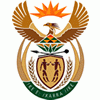
Jobs: Department of Labour - Aug 2019
Jobs: Department of Labour - Aug 2019 LondekileDeputy Director: Public Employment Services
Provincial Office: Western Cape
Reference No: HR 4/4/10/116
Salary: All inclusive: R 869 007.00 per annum
Enquiries: Mr. M Leukes, Tel: 021 4418007
Provincial Office
Chief Director: Provincial Operations:
PO BOX 872, Cape Town, 8000
Assistant Director: Research Monitoring and Evaluation
Centre: Provincial Office: North West
Reference No: HR 4/4/9/85
Salary: Commencing: R470 040 per annum
Enquiries: Winnie Ngwenya, Tel: (018) 387 8100
Provincial Office
Chief Director: Provincial Operations:
Private Bag X 2040, Mmabatho, 2735
Assistant Director: Fraud Investigation and Anti-Corruption
Centre: Provincial Office: Free State
Reference No: HR 4/4/8/241
Salary: Commencing: R 376 596.00 per annum
Enquiries: Mr. Z Mjoli, Tel: (051) 5056351
Provincial Office
Chief Director: Provincial Operations:
P O Box 522, Bloemfontein, 9300
Disability Manager (Assistant Director: Occupational Therapy)
(Re-advert, applicants who previously applied must re-apply)
Provincial Office: Kimberley
Reference No: HR4/4/8/11
Salary: Commencing: R 517 326 per annum (OSD)
Enquiries: Dr. Jood-Molaolwe, Tel: (053) 838 1588/1589
Provincial Office
Chief Director: Provincial Operations:
Private Bag X 5012, Kimberley, 8301
ERRATUM: Kindly note the post of ICT Project Manager, Ref No: HR4/19/08/13HO advertised on Vukuzenzele dated 1 August 2019, was advertised with an incorrect salary notch. The correction salary notch is R733 257(SR11) per annum (inclusive package) sorry for inconvenience.
Enquiries: Mr. F Thengwayo, Tel: 012 309 4497
Closing date: 02 September 2019

National Orders nominations open
National Orders nominations open angenithaPresident Cyril Ramaphosa is inviting deserving South Africans to nominate people from all walks of life to be bestowed with National Orders.
National Orders are the country’s highest honours to South Africans and eminent foreign nationals who have contributed to the achievement of a free, united, non-racial, non-sexist, prosperous and democratic South Africa in various ways.
Also honoured are citizens who have sacrificed life and limb to save others and those who have excelled in various fields.
Calling for nominations – the Presidency said the ceremony contributes towards unity, reconciliation and nation building.
The selection process of the awards will be processed and administered by the National Orders Advisory Council,- appointed by the President of the Republic.
Members of the council include, Chairperson Brigitte Mabandla who heads the Advisory Council and her Deputy Chairperson Mandla Langa.
The other members of the council are Glenda Gray, Molefi Oliphant, Lindiwe Mabuza, Dr Malegapuru Makgoba, Sally Padayachie, Buti Tlhagale, James Motlatsi, Fazel Randera and Nothembi Mkhwebane.
The following six orders are bestowed annually on deserving recipients:
- The Order of Mendi for Bravery recognises South African citizens who have performed acts of bravery.
- The Order of Ikhamanga recognises South African citizens who have excelled in the fields of arts, culture, literature, music, journalism and sport.
- The Order of the Baobab recognises South African citizens who have contributed to community service, business and economy, science, medicine and technological innovation.
- The Order of Luthuli recognises South African citizens who have contributed to the struggle for democracy, nation-building, building democracy and human rights, justice and peace as well as for the resolution of conflict.
- The Order of Mapungubwe recognises South Africans who have excelled and attained exceptional achievement
- to the benefit of South Africa and beyond.
- The Order of the Companions of OR Tambo recognises eminent foreign nationals for friendship shown to South Africa. It is therefore an Order of peace, cooperation and active expression of solidarity and support.
Members of the public are urged to attach a motivation about the person nominated. Self- nomination or the nomination of public servants is not permissible. The next National Orders awards ceremony will take place in April 2020. SAnews.gov.za
The 2020 National Orders nominations will close on 31 August 2019.
Nomination forms are available on The Presidency website: www.presidency.gov.za.
You can also send an email to nominations@presidency.gov.za
Sengo dives right into a man’s world
Sengo dives right into a man’s world tsoanaTransnet National Ports Authority (TNPA) acting civil diver Makhosazana Sengo is holding her own in a male-dominated world.
She is trailblazing a path for other women to follow, while staring down gender stereotyping and ocean predators at the same time.
As one of only two female divers to have ever worked for the TNPA and the only female diver currently in its employ, Sengo is well versed in overcoming adversity to achieve her goals.
Coming nose to snout with a great white shark would be enough to turn most people away from a diving career – but not Sengo. “In that moment I was very scared and traumatised, but I overcame my fear by descending again.
Now, I am so used to seeing sharks during dives,” Sengo said.
“I knew from the beginning that I had to think about the risks involved in this position. I had to be aware that there were a lot of dangers in this job. I also knew that I was entering a very male-dominated environment and I had to overcome all of this so that I could pursue my dream,” she added.
From street vendor to diver
Sengo started her diving career at the Port of Richards Bay in 2011, as a diver attendant, but her links to the port go deeper than her diving tenure alone.
Prior to discovering her passion to dive, the Mtubatuba resident was well-known as an arts and crafts vendor stationed on the quayside. She supported her family by selling her bead-work and soft stone sculptures to Richards Bay tourists.
Her desire to learn more about the ocean came from the celebrated – former South African Paralympian, Natalie du Toit.
“Here was this woman, who faced so many hardships and was winning gold medals, and I wondered what it was that was stopping me from learning how to swim?”
Sengo began lessons and after achieving her swimming stripes embarked on a lifeguarding course, which led to her earning a sponsorship from the UK-based Professional Association of Diving Instructors (PADI) to participate in a Recreational Diving Course. It was then that her journey towards becoming a professional diver gained traction.
“While I was participating in lifesaving training, I already felt like I wanted to explore the underwater world. It triggered something inside me that told me I was going to be a diver and was going to explore the beauty of the sea and sea life,” she said.
What does a Transnet civil diver do?
As an acting civil diver, Sengo’s duties include working underwater with technical surface supply equipment; conducting underwater welding, cutting and grinding; underwater quay wall inspection and repairs; underwater maintenance of marine crafts and inspections, using subsea project equipment; general inspections and underwater photography; and participating in surface quay wall furniture maintenance.
“My work environment is never the same, it changes every day. Each day I learn something new and that’s the exciting part of my job,” she said.
Sengo has Open Water Diver, Advanced Diver and Rescue Diver qualifications under her belt and earlier this year she participated in and passed a two-month Class 3 and 4 Inshore Civil Diver training programme with Seadog Commercial Diving in Saldanha Bay.
The mother of one is not content with being idle now that she has broken through the door of one profession. She is already working towards a degree in Civil Engineering and plans to pursue training as a Class 2 and diver medical technician.
Sengo is aware that her role at the TNPA turns the spotlight on the lack of women in the profession, but wants her journey to serve as inspiration to other young women to follow in her footsteps.
“You need to be passionate about something in your life, to dream big and believe in yourself. I want to guide everyone who needs my help. I was scared in the beginning, but I overcame all of my fears and I am reaching my goals one by one,” she said.
Sowing seeds of success
Sowing seeds of success vuyelwanKwaZulu-Natal (KZN) entrepreneur Ntando Thabethe (42) is driving her company, Elite Crop, to become Africa’s leading fresh food processing company.
Elite Crop is a successful hydroponic tunnel farm, located in Thabethe’s backyard in Pinetown.
Only launched in 2018, it has already broken into commercial markets locally and internationally.
Thabethe left her mechanical engineering job to open the company, which produces a variety of fruits and vegetables, including dried herbs and fresh, frozen and processed vegetables and fruits.
“I have always been passionate about farming, but I could not get on with it due to work commitments. However, I have always believed that I can make anything work for me if I apply my mind to it,” she said.
Tired of opening her bedroom window every morning and being greeted by a dull backyard, Thabethe’s hydroponic tunnel farm has added the colour that she was longing for.
“Knowing that the area was not zoned for farming, I took a chance and went to the local municipality to seek approval to have the tunnel farm in my backyard. I never looked back. That was the beginning of the journey,” she said.
The company recently added two soups to its product range - chicken and chives and pepper steak and mushroom – which are available at major chain stores and supermarkets in KZN. It also supplies and installs hydroponic tunnels locally.
Accessing markets
In early 2019, Thabethe was invited to attend a patent and trademark workshop organised by the Department of Agriculture and Rural Development’s Agribusiness Development Agency (ADA). The ADA aims to ensure a diverse, deracialised and sustainable agribusiness sector in KZN.
The workshop was facilitated by the Small Enterprise Development Agency, which selected Elite Crop to be trademarked. It also assisted with marking the brand, testing the processed products and finding a market to sell them to.
Looking ahead, the company’s products will soon be available in Dubai. “Elite Group recently signed a contract in Dubai to supply all of our dried produce, including rosemary, thyme, parsley, chives and tomato powder,” Thabethe confirmed.
Sisipho Zamxaka works for the Agribusiness Development Agency
For more information on the Agribusiness Development Agency call 033 347 8600.
Starting a vegetable garden
Starting a vegetable garden tsoana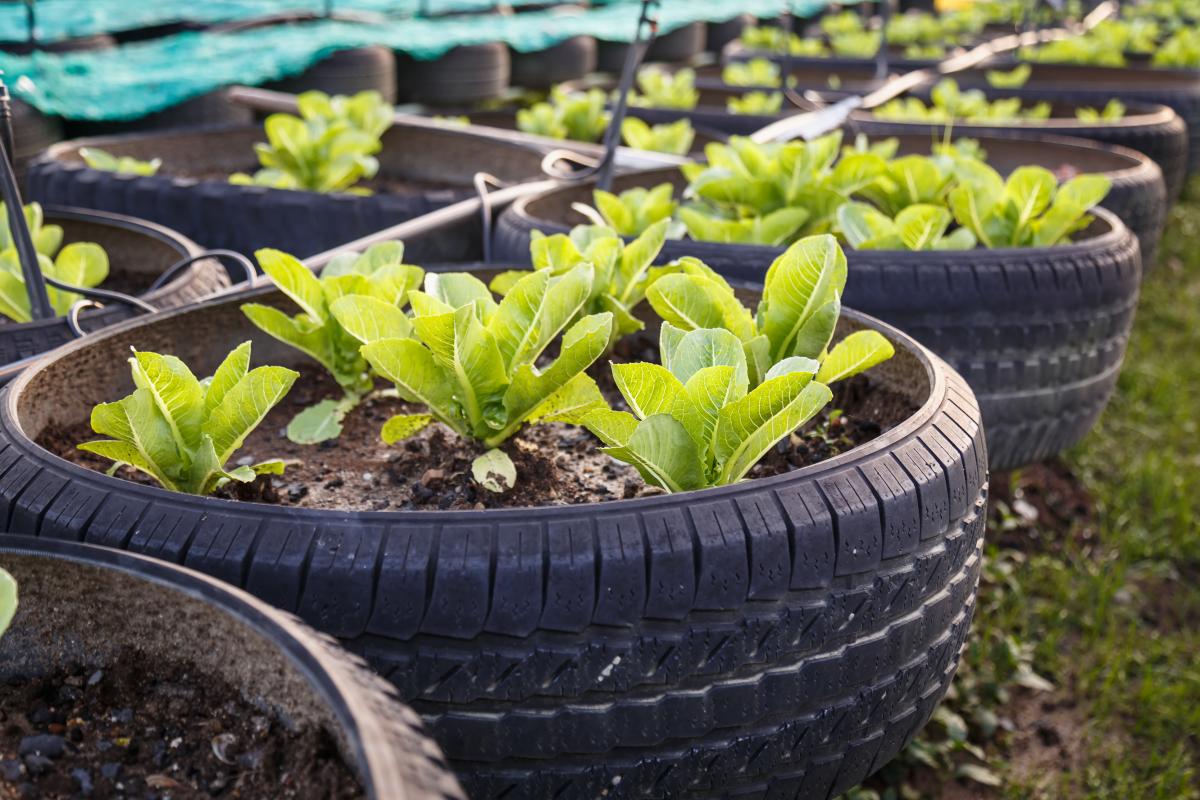 The Department of Agriculture, Forestry and Fisheries (DAFF) has a few tips to help people successfully grow fruit and vegetables in their backyards.
The Department of Agriculture, Forestry and Fisheries (DAFF) has a few tips to help people successfully grow fruit and vegetables in their backyards.
Getting started
Start small and add a few more plants every planting season. Remember that gardens need water and sunlight.
Soil preparation is essential – loosen soil before planting.
The best time to water plants is in the mornings or last thing at night, rather than during the heat of the day.
Avoid planting on slopes because of water run-off, which will result in precious water not reaching your plants.
If you do not have a lot of space, use other planting methods. Try placing the soil in sacks and creating holes for the seedlings to push through or use old car tyres. Tyres can be stacked on top of each other for plants that need lots of soil. This also raises the plants, making it easier for disabled or older persons to garden as well.
Planting in containers like sacks, pots and tyres also saves water. Remember that grey water (like bath water) can be useful for irrigation.
Kitchen waste, such as vegetables peels or unused leaves, can be used for organic compost.
Don’t forget indigenous agriculture practices, such as using livestock manure for compost.
Common mistakes that could affect your garden
Weeds compete with plants for nutrients so it is important to do proper weeding to avoid your plants dying.
Planting next to big trees is also a problem because the tree will shade the plants and they will not get enough sunlight.
Overwatering is bad because waterlogged soil can rot the root system of the plants and kill them.
Also remember that spacing should be adequate to avoid plants competing for sunlight, water and nutrients.
South Africans are encouraged to participate in programmes run by provincial departments, such as:
- The Comprehensive Agricultural Support Programme,
- Ilima/Letsema,
- Fetsa Tlala and
- One Household One Garden.
To find out more about these programmes, visit your nearest DAFF office.
Taking pride in indigenous food
Taking pride in indigenous food tsoana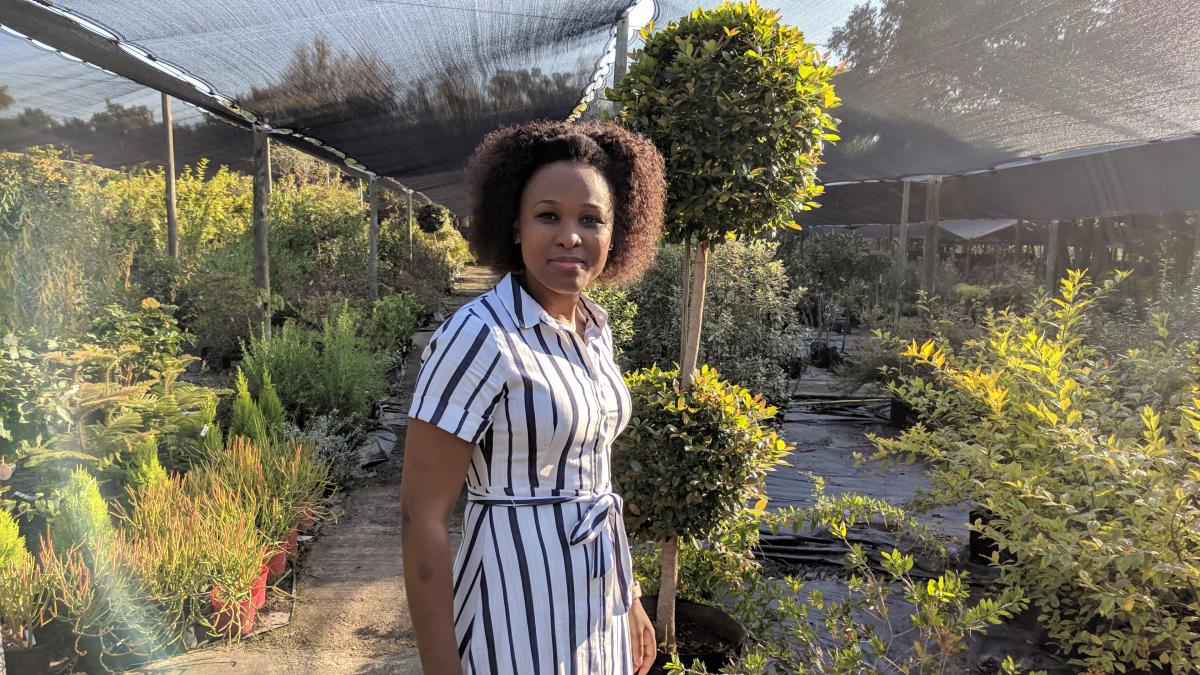 Siphamandla Manqele (28) aims to see her company, Local Village Foods, connecting African countries through food.
Siphamandla Manqele (28) aims to see her company, Local Village Foods, connecting African countries through food.
Manqele, a health enthusiast who is originally from Lusikisiki in the Eastern Cape, said she wants to bring healthy eating back to South African homes and build a sense of pride amongst Africans about indigenous food.
“We are a Pan-African brand. We source African super foods, like grain, that are indigenous to the African continent,” she said.
Local Village Foods, which employs two people, sources only naturally grown food from small scale farmers across the continent. Its range includes grains, granola, raw African honey, gluten-free flour and porridge.
Manqele, who was selected as one of the Mail and Guardian’s 200 Young South Africans in 2019, in the business and entrepreneurship category also received assistance from the National Youth Development Agency to setup a stall at the Bryanston Organic and Natural Market where she sells her products.
“We source indigenous food from east Africa, Nigeria, Zimbabwe, Malawi and South Africa. We are trying to create a food company that connects people, using food as a vehicle.
“We want to ensure that we can achieve rural development in different parts of the continent,” she said.
Manqele aims to sell healthy food, that does not contain unhealthy chemicals. "Organic food is not only healthier, but cheaper too, as people can plant it themselves and create a value chain of entrepreneurs in rural areas," she said.
Technology to provide clean water
Technology to provide clean water angenithaKusini Water’s solar- and gravity-powered water purification systems are bringing clean water to underserviced areas.
Nanotechnology is used to manipulate individual atoms and molecules.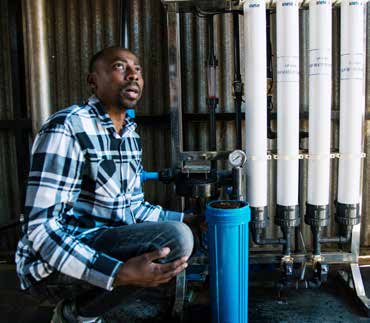
The solar-powered water filtration system, invented by Mafumo, purifies water from any source. A pipe connects the water source to the device which filters the water between the shells and nanofibres to produce water that is safe for drinking.
Mafumo (33) said 1 000 litres of clean water are produced every hour for a period of 10 hours by the system that he created.
He explained that the connection pipe is fitted to the top of the device and water flows from the top through the system using gravity. It runs through the membrane and the macadamia shells, trapping most of the chlorine and bacteria.
The entrepreneur said the water filtration system is already being used in several areas, including Vhembe in Limpopo and Heidelberg and Hammanskraal in Gauteng.
The system costs R55 000 and is aimed at assisting communities and schools rather than individual households.
“Our systems are installed in low-income communities such as informal settlements and rural areas,” he said.
Mafumo, who holds a Bachelor of Technology Degree in Chemistry from the Cape Peninsula University of Technology, left the City of Joburg’s water agency, where he worked as a research and development official, to become an entrepreneur.
He said finding cost-effective solutions to some of the country’s water challenges had become increasingly important to him and he decided to leave the world of formal employment and dedicate himself to this cause.
His filtration system idea won the Small Enterprise Development Agency (Seda) Pitch and Perfect competition in 2018.
After winning the Pitch and Perfect competition, Seda took Mafumo to the Global Entrepreneurship Summit in the Netherlands. The trip has netted Mafumo potential investments from Europe and the United States of America.
For more information about Seda call 0860 103 703 or send an email to info@seda.org.za.
The ‘queen’ of the boxing ring
The ‘queen’ of the boxing ring tsoana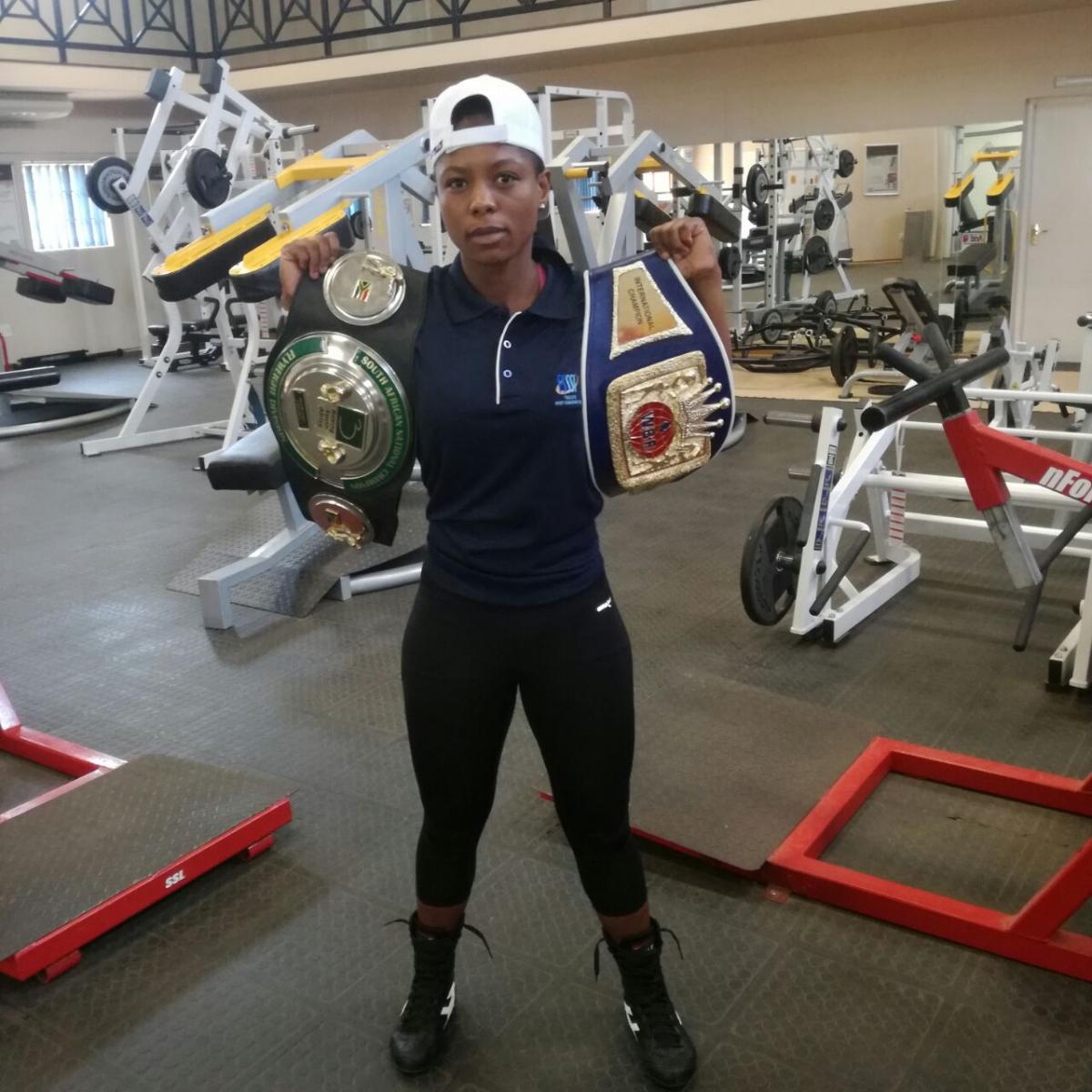 While some might take up boxing because of their passion for the sport or the adrenaline rush it gives, Matshidiso ‘Scorpion Queen’ Mokebisi said becoming a boxer saved her from a life of gangsterism and substance abuse.
While some might take up boxing because of their passion for the sport or the adrenaline rush it gives, Matshidiso ‘Scorpion Queen’ Mokebisi said becoming a boxer saved her from a life of gangsterism and substance abuse.
“When I was younger, I used to have unexplainable anger issues which led me to join a gang and to smoke weed. When I ventured into boxing, the sport helped me to channel those energies in the right direction,’’ she said.
Mokebisi (30), who originates from the Free State, said boxing is a tough sport that teaches mental and physical endurance.
However, she said after 16 years in the sport, she is finding it even harder for women to progress.
“Most tournaments are for men and as women, we struggle to be booked for matches. It is so bad that in recent years, I’ve only taken part in one match a year.”
Mokebisi is the current holder of the South African Junior Featherweight, World Boxing Federation International Junior Featherweight and the African Boxing Union SADC Featherweight titles.
She said that she lives in hope that every time she is in the gym and the ring, she is working towards changing the perceptions of women’s boxing.
Mokebisi has about six years left as a professional boxer but she does not plan on retiring completely from the sport.
“I want to go into promoting boxing as a way of helping up-and-coming women boxers so that they don’t have to struggle as I have,” she said, adding that promoters play a vital role in developing gender equality in the sport.
“The onus is on the promoters; when they host boxing tournaments, they must include women. There should be an equal number of matches for men and women.”
With South Africa celebrating Women’s Month, Mokebisi said that as a woman, boxing has helped her to showcase her talent and uniqueness.
“Women should know that they are special and unique in every way. We can succeed at anything we need to do. To women in boxing, I say don’t give up. Together we can grow the number of female boxers in South Africa.”
You can reclaim your life after abuse
You can reclaim your life after abuse Ursula Survivors of Gender-Based Violence (GBV) often feel trapped and hopeless. Despite having their dignity stripped away by violent partners or relatives, threats and intimidation from their abusers sometimes make it seem impossible to escape.
Survivors of Gender-Based Violence (GBV) often feel trapped and hopeless. Despite having their dignity stripped away by violent partners or relatives, threats and intimidation from their abusers sometimes make it seem impossible to escape.
But women should realise that they have the power to stand up for themselves, leave their abusive relationships and live their lives to the fullest.
*Sandiswe Gabayi is a survivor of GBV.
“I was raped numerous times, by neighbours, family members and people I thought I could trust. I was too young to realise at the time what was happening, but when I look back now, I can see how shocking it all was,” Gabayi said.
She eventually found the strength to move on and today, free from the clutches of abuse, she is a successful playwright.
Women in abusive relationships must find the courage to leave, she said.
“I know it can be very difficult, thinking of where you can go and how you can start your life over. Your partner may tell you he owns you, because he provides the money and is stronger than you, but you have to realise that your life does not depend on one person. If you are being abused, then you are not living, you are just trying to survive. You can only live your life and reach your full potential once you are out of that relationship.”
Mara Glennie is the founder and director of the Transform Education About Rape and Sexual abuse (TEARS) Foundation, an organisation that provides support services to survivors of abuse. A GBV survivor herself, Glennie said women in abusive relationships should not be trapped by confusion, guilt or self-blame.
“The only thing that matters is your safety. You are not to blame for being abused, and you are not the cause of your partner’s behaviour. You deserve to be treated with respect; you and your children deserve a safe and happy life. And you are not alone – there are people waiting to help,” said Glennie.
*Sandiswe Gabayi is not her real name.
Did you know? You can go to your nearest police station for medical attention, a safe shelter and for counselling if you are a survivor of GBV. The TEARS Foundation also has a free SMS helpline - *134*7355# to assist you.
Young chef cooking her way to the top
Young chef cooking her way to the top Ursula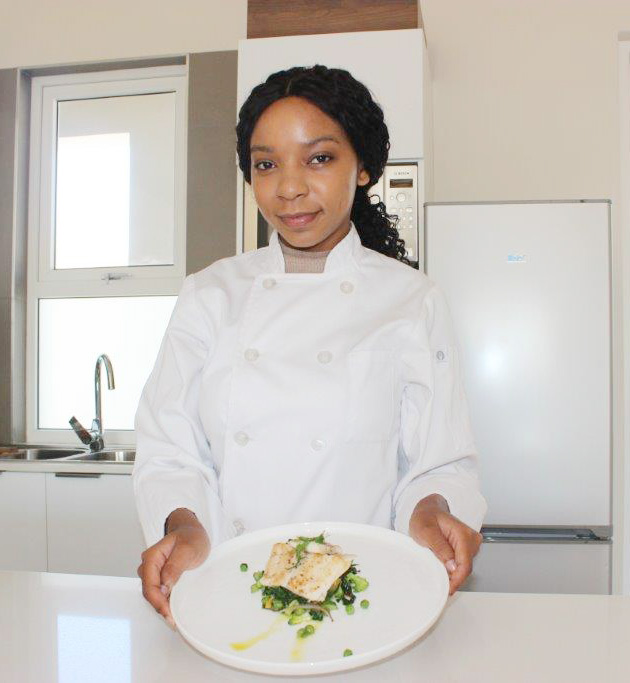 Unlike many newly-qualified chefs who opt to work for a hotel or a restaurant, Leigh-Ann Modise decided to spice things up and open her own business, named Cumin, the seed of a warm-climate herb that is popular in Latin American, Middle Eastern, African and Indian cuisine.
Unlike many newly-qualified chefs who opt to work for a hotel or a restaurant, Leigh-Ann Modise decided to spice things up and open her own business, named Cumin, the seed of a warm-climate herb that is popular in Latin American, Middle Eastern, African and Indian cuisine.
The 22-year-old said the main goal of her business is to influence healthy eating across South African homes, including in rural areas.
Cumin offers a range of services, including cooking lessons, catering for intimate events, providing a chef to cook private meals and weekly meal preparations for individuals who either want to lose or gain weight.
“All menu items for occasions are designed around client specifications to give their palate the ultimate satisfaction,” explained Modise, who completed her Culinary Arts Degree from the International Hotel School in Johannesburg in 2018, where she also obtained her Food Preparation Diploma.
She has always been passionate about cooking and remembers making her first omelette when she was just four, which explains why she did not wait to graduate to start Cumin, initially as a food blog but today a registered business with a team of five qualified chefs.
In addition, Cumin sub-contracts students whenever it has big events. “I give students an opportunity because I remember being a student and broke… This is my way of giving others an opportunity,” she said.
Although her business is only kicking off, Modise is already making a name for herself. She contributed to Mogau Seshoene’s cookbook The Lazy Makoti’s Guide to the Kitchen as an assistant chef and has cooked for the Ambassador of France to South Africa, Christophe Farnaud, and his diplomatic guests in celebration of Africa Month in 2018. She was also the head chef for the French Consulate’s annual Bastille Day celebration in Johannesburg.
“That was the biggest number of people I have ever cooked for… there were about 500 guests,” she said.
She disagrees with the idea that eating healthy is expensive and adds that you can have a full healthy meal just by preparing your own food at home.
“People in rural areas and townships can grow their own vegetables which are also organic foods and are a cheaper way to eat healthy,” she said.
Young girls have a sporting chance of becoming a pro
Young girls have a sporting chance of becoming a pro angenithaFrom dusty village streets to international arenas, Proteas cricketer Ayabonga Khaka has had the journey of a lifetime as a professional sportswoman.
hen Ayabonga Khaka (27) started playing cricket as a young village girl, she had no idea that she would one day represent her country.
The Proteas fast bowler said that becoming a professional sportswoman is less daunting today than when she started out.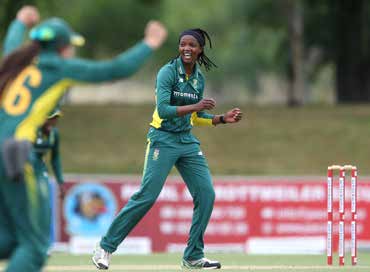
“Young girls can and should pursue sporting careers now. There are structures in place and professional leagues are developing. For example, the 14 of us who play for the Proteas have contracts with the team and do not have outside jobs,” said Khaka.
“Young girls must learn to make their own decisions. You can’t let people discourage you from what you want to do. I know that parents often advise us that a sports career is too short, but at the end of the day you must make your own decisions.”
The cricketer signed her first contract with the Proteas in 2014, having played for the team since 2012. “I somewhat expected the call-up to the team because I had been playing very well but I still worked hard for it,” she said.
She said in her debut match against Bangladesh, she was surprised to see 15 000 people had filled up the stadium to watch the game.
Khaka, who has taken 62 wickets while scoring 79 runs in 54 games for the national team, started playing cricket in the rural town of Middledrift in the Eastern Cape, where she would join the village boys in their games of soccer, rugby and cricket.
“It was in primary school that I started to focus more on cricket,” she said.
Despite not having access to decent sporting facilities, she continued to excel in the game and when she was 15, Border Women’s Cricket signed her up to play for their under 19 team after spotting her in action in a club cricket game.
Khaka, who holds a Bachelor of Health in Human Movement Science from the University of Fort Hare, said young girls who want a sports career should not neglect their academic studies because it is always wise to have a back-up plan.
As South Africa celebrates Women’s Month Khaka said women should work together to fight Gender-Based Violence. “Women’s Month for me means that we should come together as the women of South Africa
to fight social ills taking place
in our society every day,” she said.